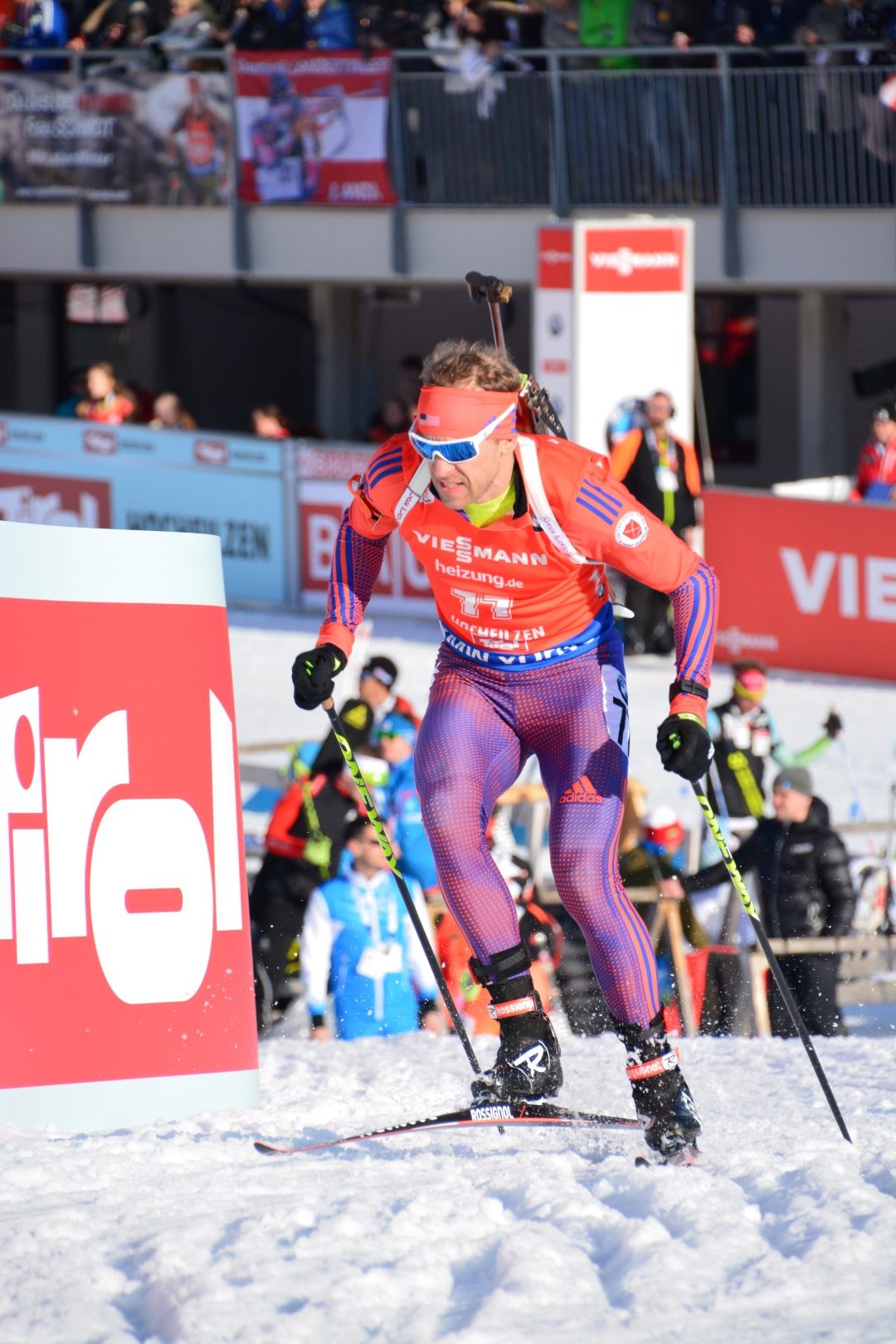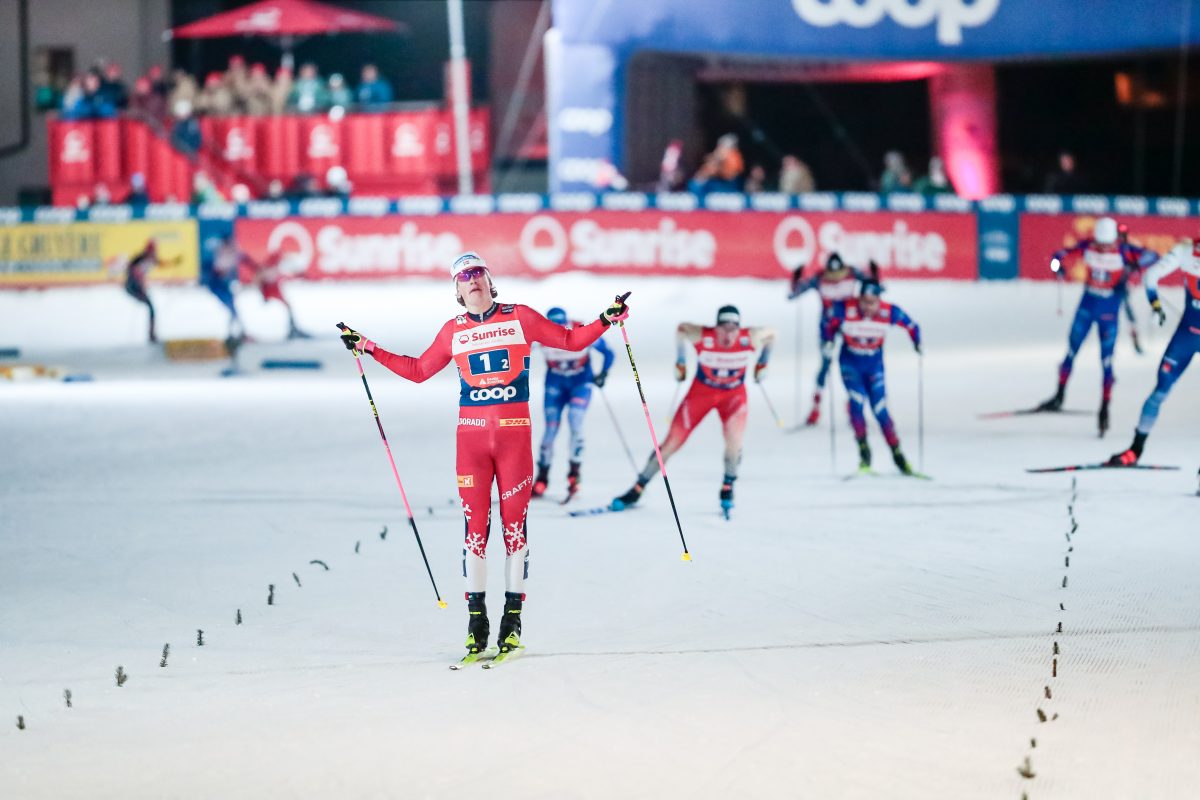
HOCHFILZEN, Austria – The U.S. men’s biathlon team got off to a slow start this year. Sean Doherty had mononucleosis. Leif Nordgren injured his toe in a freak accident and had to miss weeks of competition. And Tim Burke said he has felt “flat” all season.
Many have been frustrated…
“Except for Lowell!” Burke exclaimed, referring to teammate Lowell Bailey. “One of the benefits of having a strong team is that when some of us have been struggling for different reasons, it’s great to have someone doing well. It brings up morale for the team a lot, and he has been that guy for us this season.”

The men’s 10 k sprint at World Championships was no exception. Bailey shot perfectly and finished fourth, 29.5 seconds behind Benedikt Doll of Germany, a first-time World Champion.
When he crossed the finish line, Bailey was in second place. But he was later knocked off by later starters.
“I am really happy with the result,” he said. “It’s the wooden medal, as they say in Germany. But I think more important to me is that I really feel like I did everything that I could do today. This was what I could do for the day, and I guess I can be proud for that.”
That gives Bailey the second-best Championships result ever by an American. Burke won silver in 2013 and Josh Thompson in 1987, both in the 20 k individual. Bailey’s fourth-place finish is the next best result, and the best ever in a sprint competition.
The first key to his success was clean shooting. A number of top racers had a tough time on the range: Martin Fourcade of France, for instance, missed a shot each in prone and standing. He finished third (which he considered a miracle – in the post-race press conference, Fourcade admitted that with two penalties the best he had initially hoped for was a top ten).
“Yeah, it’s tricky wind here,” Bailey said. “It’s sensitive. It moves the bullet quite a bit for a relatively small amount of wind. I spent a lot of time on the range before the race just standing and watching the flags, and getting a good idea when I zeroed what the wind was. And what I would do if it shifted one way or the other.”
Doll and runner-up Johannes Thingnes Bø of Norway both cleaned, as did Bailey, sixth-place Krasimir Anev of Bulgaria, and six others scattered throughout the field.
“When I came into prone, the wind was about where I zeroed, at about four o’clock left to right,” Bailey explained. “So I kept my zeroing the same, and just — the one thing I have learned over the years is it’s better to be aggressive and decisive in the range. Go with what your gut feeling [is], rather than second-guessing yourself. So I tried to be decisive.”
Another key was shooting fast. Bailey had the second-fastest total shooting time of the entire 106-man field. He finished just 1.2 seconds ahead of fifth-place Ondrej Moravec and his shooting time, six seconds faster than the Czech’s, helped him get there.
“I worked all year on the sports psychology front, to not worry so much about the results but worry about the quality of my performance,” Bailey said. “Things like getting to my first shot in 11 seconds, taking an aggressive shooting cadence, efficient range times, and all this dorky biathlon stuff that I have been working on for years, really. But if feels good to put it all together.”
If you can put together that kind of a shooting performance, a merely “good” day on skis can still net a great result. Bailey had the 23rd-fastest course time, and said that he didn’t exactly feel like a superhero on Hochfilzen’s big, rolling climbs.
“It wasn’t one of those days where you go out and you don’t feel any pain,” Bailey laughed. “It definitely hurt, a lot. But I think the ski speed was there, and we had a really good preparation camp that set us up well for the race. So I think I am truly happy with everything about the race today.”
It has been a big year for Bailey. He is now a father – his wife and daughter joined him and U.S. support team at the finish as he waited for the flower ceremony – and he has played a major role as one of the International Biathlon Union’s Athlete Representatives, lobbying hard for anti-doping reforms in the wake of the McLaren report.
On one hand, that’s a lot to handle. But on the other, the University of Vermont graduate (who double majored in political science and environmental studies) isn’t shocked that he is able to turn in some of the best performances of his career despite having so much on his plate.
“I always make sure that training and biathlon is the priority,” he explained. “And then, if I can fit things in, I try to do this Athlete Representative thing. I always have that kind of threshold in my head. If it’s ever too much then I will say, okay, I’ll do it later. Biathlon always comes first. But on the other hand, I good balance can be really positive. And I know every athlete is different, but definitely for me having balance in my life is crucial. Having my family as something I can be [about] away from biathlon, and being with my family and not worrying about sport.”
While Bailey has been focusing on process rather than results or standings, his teammates were not at all surprised at the numerical, record-book aspect of his most recent result.
“He has been really close all year,” Burke said. “He’s been between 10th and 20th almost every single race. Any time you have the ability to consistently do that, you also have the ability to be on the podium.”
But if Bailey has been a rock for his teammates this season, he is still humble about it. And he believes in them. In the second relay after Nordgren and Doherty returned to the World Cup, the team finished sixth, and Bailey says there’s more to come. He has a shot at the podium again on Sunday in the pursuit – but he is also looking forward to the relay.
“Honestly I don’t feel any pressure, because I know all four guys that are here can pop a podium race any day,” Bailey said. “And I wouldn’t be so surprised at all if one of them did that in these World Championships. And as much as there have been some setbacks for Sean [Doherty] and Leif [Nordgren] with health issues, I think we are all in a pretty good place right now… If you kind of analyze and read between the lines in the results it looks pretty good for our team. I think it may have been a slow start for some athletes, but if I were a betting person I would bet on the U.S. guys.”
— Harald Zimmer contributed
Chelsea Little
Chelsea Little is FasterSkier's Editor-At-Large. A former racer at Ford Sayre, Dartmouth College and the Craftsbury Green Racing Project, she is a PhD candidate in aquatic ecology in the @Altermatt_lab at Eawag, the Swiss Federal Institute of Aquatic Science and Technology in Zurich, Switzerland. You can follow her on twitter @ChelskiLittle.



